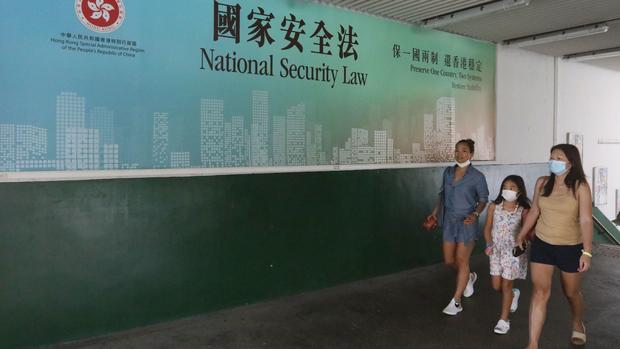 Pedestrians in Tsim Sha Tsui walk past a poster that says national security law for Hong Kong will preserve “one country, two systems” and restore stability. (PHOTO / CHINA DAILY)
Pedestrians in Tsim Sha Tsui walk past a poster that says national security law for Hong Kong will preserve “one country, two systems” and restore stability. (PHOTO / CHINA DAILY)
The Hong Kong government has voiced strong support for the national security law for the special administrative region passed unanimously by the country’s top legislature on Tuesday morning, pledging efforts to implement the law to ensure the city’s long-term prosperity.
Hong Kong Chief Executive Carrie Lam Cheng Yuet-ngor welcomed the passage of the law in an online statement. Lam said it was “necessary and urgent” and “an important step” to improve implementation of the “one country, two systems” principle.
Two government departments involved in enforcing security law also strongly backed its passage — in separate statements issued on Tuesday evening.
Secretary of Justice Teresa Cheng Yeuk-wah and Secretary for Security John Lee Ka-chiu, both members of the Committee for Safeguarding National Security that will be established and chaired by the chief executive, said they would fulfill the requirements of the law to establish local special units for safeguarding national security.
Cheng said a dedicated unit under the Department of Justice has been set up to handle prosecutions and related legal matters on national security.
I urge the international community to respect our country’s right to safeguard national security, and Hong Kong people’s aspirations for stability and harmony.
Carrie Lam Cheng Yuet-ngor, chief executive of Hong Kong
In a statement co-endorsed by heads of the city’s six disciplinary forces including Police Commissioner Tang Ping-keung, the secretary for security said he will lead the disciplinary forces to “fully discharge their due responsibilities to implement the national security law”. Lee noted that a special police unit — as required under the new law — is being established as part of an enforcement mechanism to effectively safeguard national security.
Four local police associations also issued a joint statement in support of the national security law. On behalf of the 30,000 police officers in the city, the heads of the associations vowed to continue to resolutely protect national security, public order, and people’s safety in the city.
The associations include the Hong Kong Police Inspectors’ Association, the Junior Police Officers’ Association, the Superintendents’ Association and the Overseas Inspectors’ Association.
In a separate statement, customs officers also said they will continue to perform their duties as “gatekeepers”. They will spare no effort in safeguarding national security in accordance with the law.
The national security law, tailor-made for Hong Kong, prohibits acts of secession, subversion, terrorism and collusion with foreign or external forces which endanger national security.
The law was listed in Annex III of the Basic Law and came into effect later on Tuesday after publication in the gazette.
Welcoming the security law, Andrew Leung Kwan-yuen, president of Hong Kong’s Legislative Council, appealed to the international community to understand the law. He said it would be a boon to the city’s economic recovery and global presence as a financial center.
Meanwhile, he called for the SAR government to explain the enforcement details to legislators, as well as to the public.
The chief executive of the SAR also called on the global community to respect Beijing’s decision to legislate a national security law in a city which “has been traumatized by escalating violence fanned by external forces”.
“I urge the international community to respect our country’s right to safeguard national security, and Hong Kong people’s aspirations for stability and harmony,” Lam said in a video address at United Nations Human Rights Council meeting.
In a joint statement, all Hong Kong deputies to the NPC expressed “unreserved support” for enactment of the security law, citing legal loopholes exposed by a year of protest violence likely fueled by foreign intervention.
They said they appreciated the efforts by national legislators who, during the legislative process, listened to opinions from local deputies, law experts and community leaders in the city.



